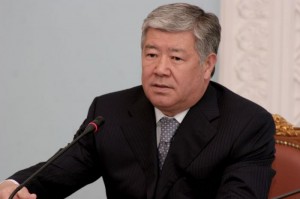Almaty submitted its candidature filesto the International Olympic Committee (IOC) to host the 2022 Olympic Winter Games on Jan 6.
“It is important for Almaty to win the right to host the Olympics. Our responsibility is to develop the city. The Olympics will be the main event which will contribute to the development of the city. People must understand the significance of the Olympics. We have plenty of opportunities to win [the bid],” said Akim (Mayor) of Almaty Akhmetzhan Yessimov.
“Almaty 2022 can be a catalyst for social, economic and sports growth in the region where winter sports facilities are badly needed,” said Vice Mayor Zauresh Amanzholova.
“Many recommendations of Olympic Agenda 2020 were taken into consideration while developing the concept of the 2022 Winter Games. We believe our bid is a perfect fit with this new philosophy and brings essential benefits to Almaty and the Kazakhstani people,” she added.
The Olympic Agenda 2020 is a strategic roadmap for the future of the Olympic movement which allows for more flexibility in the bid process and has a stronger emphasis on legacy, lower costs and improved sustainability.
Andrey Kryukov, a member of the Kazakh National Olympic Committee, expects that the run-up to the Olympic Games in Kazakhstan will create 50,000 new jobs.
“According to the preliminary evaluations of the IOC, Almaty is 62 percent ready for the Olympics. We only need to build a complex for short track and figure skating and slopes for the skeleton and bobsled competitions. The remaining infrastructure will be built for the Universiade, which will be held in Almaty in 2017,” said Kryukov.
The city’s Baluan Sholak sports complex has a capacity of 3,000 people. For the Olympic competitions it will need to be renovated to accommodate up to 5,000 people. The landmark Medeu ice rink will also need to be covered with a roof. According to IOC rules, Winter Olympics competitions (except for cross-country skiing, biathlon and ski jumping) are held only in closed complexes.
“Of course, we already have rough estimates of costs for the preparation and holding of the Winter Olympics in Almaty in 2022,” said Temirkhan Dosmukhambetov, President of the National Olympic Committee. “But for now, we are negotiating with the IOC so that they assume some of the costs. If they do, then given the fact that the major national metropolis already has almost all the infrastructure for major international competitions and we have most of the sports facilities that meet international standards, the costs will be small. I think that they will be $7-8 billion. This figure includes the hosting of the Winter Games in 2022 and the preparations for them, the construction of the remaining sports facilities and urban infrastructure. All of the infrastructure will remain afterwards and will be used by Almaty residents and guests of the southern capital. No need to compare the amount that was spent on the preparation and conduct of the Sochi 2014 Olympic Games. There, virtually everything was erected from scratch. We already have much of what is needed for the games.”
The special IOC delegates will stay in the city Feb. 14-18 and, after discussing the results of the visit, will travel to Beijing where they will stay March 24-28. The winner will be determined at the organisation’s July 31 session in Kuala Lumpur.
“Working with the two candidate cities, we will apply the first reforms which were approved by the IOC members very recently in Monaco as part of our Olympic Agenda 2020 roadmap. This will be done through ongoing consultation with the candidate cities,” said IOC President Thomas Bach.
The IOC has informed the candidate cities that the 2022 host city can anticipate a contribution from the IOC to the success of the games of an overall estimated value of $880 million. This contribution consists of a share of the revenues from marketing programmes run by the IOC, contribution related to broadcast revenues, services provided by Olympic Broadcasting Services as the host broadcaster of the games and assistance provided to the organising committee by the IOC and related entities. In addition, the IOC will also grant other rights and benefits and provide other forms of assistance to the organising committee for the success of the games which are described in the host city contract and will be made public.
Changes that already apply to the 2022 bidding process include the IOC’s obligation to determine and communicate to the city at the time of its election the full composition of the Olympic programme and new wording on non-discrimination relating to the Olympic Games and its participants based on Fundamental Principle 6 of the Olympic Charter.
IOC Russian member Alexander Zhukov, who will analyse the candidature files and make on-site inspections of the two cities, will chair the IOC Evaluation Commission for the 2022 Olympic Winter Games. Joining the Commission will be IOC Olympic Games Executive Director Christophe Dubi and IOC Head of Olympic Bid City Coordination Jacqueline Barrett.
Together with each bid team, the evaluation commission will examine the 14 themes of the IOC’s candidature questionnaire, which include topics such as vision, legacy and engagement, transportation, accommodation, finance and sustainability. The commission will also visit the competition and non-competition venues proposed in the bid.
The commission’s report, highlighting the risks and opportunities of the candidate cities’ projects and the athletes’ experience, will be published prior to the IOC 2022 briefing for IOC members, which will take place June 9-10 and will be made available on the IOC’s official website.

